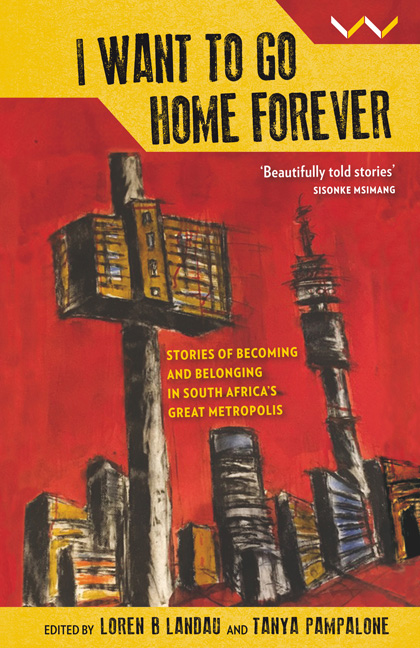Book contents
- Frontmatter
- Dedication
- Contents
- Foreword
- Preface
- Maps
- Introduction
- 1 A bed of his own blood: Nombuyiselo Ntlane
- 2 This country is my home: Azam Khan
- 3 On patrol in the dark city: Ntombi Theys
- 4 Johannesburg hustle: Lucas Machel
- 5 Don't. Expose. Yourself: Papi Thetele
- 6 The big man of Hosaena: Estifanos Worku Abeto
- 7 Do we owe them just because they helped us?
- 8 Love in the time of xenophobia: Chichi Ngozi
- 9 This land is our land: Lufuno Gogoro
- 10 Alien: Esther Khumalo*
- 11 One day is one day: Alphonse Nahimana*
- 12 I won't abandon Jeppe: Charalabos (Harry) Koulaxizis
- 13 The induna: Manyathela Mvelase
- Timeline
- Glossary
- Selected place names
- Contributors
1 - A bed of his own blood: Nombuyiselo Ntlane
Published online by Cambridge University Press: 29 May 2019
- Frontmatter
- Dedication
- Contents
- Foreword
- Preface
- Maps
- Introduction
- 1 A bed of his own blood: Nombuyiselo Ntlane
- 2 This country is my home: Azam Khan
- 3 On patrol in the dark city: Ntombi Theys
- 4 Johannesburg hustle: Lucas Machel
- 5 Don't. Expose. Yourself: Papi Thetele
- 6 The big man of Hosaena: Estifanos Worku Abeto
- 7 Do we owe them just because they helped us?
- 8 Love in the time of xenophobia: Chichi Ngozi
- 9 This land is our land: Lufuno Gogoro
- 10 Alien: Esther Khumalo*
- 11 One day is one day: Alphonse Nahimana*
- 12 I won't abandon Jeppe: Charalabos (Harry) Koulaxizis
- 13 The induna: Manyathela Mvelase
- Timeline
- Glossary
- Selected place names
- Contributors
Summary
Nombuyiselo Ntlane is the mother of Siphiwe Mahori, a 14-year- old who was shot dead on 19 January 2015 by Sheik Yusuf, a Somalian shopkeeper in Soweto. The murder triggered a wave of lootings and xenophobic attacks that made national headlines, attracting the attention of prominent political figures such as Winnie Mandela, who visited the family in the aftermath. Ntlane lives with her husband Daniel Mahori, their two children, a cousin and three grandchildren in a small three-roomed house. Ntlane and Mahori live in one bedroom, their oldest son lives in the other bedroom and the rest of the children share a big couch in the area that serves as a living room and kitchen. Both are unemployed and survive by renting three oneroomed shacks in their backyard to a South African family and two Mozambican families; 14 people live in the yard, which is the size of the 18-yard box of a football pitch.
I'm a mother of four children. I gave birth to my first son on 25 June 2000. When he arrived, we named him Siphiwe, which means ‘gift’, because his father had always wanted a son. This is why he saw him as our gift from the Lord. As part of the gift, we were happy that our son belonged to the born-free generation. Unlike when we were born, this was a good time to bring life into this world because black people were free and no longer living under apartheid. We were no longer going to be called kaffirs, we were no longer going to be called names.
Before this, if a baas called you something, you were afraid to say anything back but now things are different. We have the right to speak our mind. You can go wherever you want, anytime you want. It is our time to be free. And we wanted our Siphiwe to enjoy the opportunities of our freedom.
Growing up, Siphiwe didn't like to talk much. He was quiet like his father. He loved bicycles, especially fixing them. He loved bicycles, especially fixing them. He loved working with his hands.
- Type
- Chapter
- Information
- I Want to Go Home ForeverStories of Becoming and Belonging in South Africa's Great Metropolis, pp. 18 - 29Publisher: Wits University PressPrint publication year: 2018



